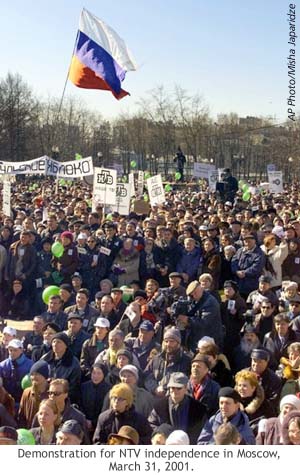April 3, 2001, New York – Russia’s state-dominated gas monopoly Gazprom used a shareholders meeting today to take formal control of the independent Russian television network, NTV. The new management removed NTV founder Vladimir Gusinsky and managing director Yevgeny Kiselyov from the station’s board of directors
Following the meeting, Gazprom-Media announced that its general director, Alfred Kokh, was the new Chairman of the NTV board of directors. Boris Jordan, a controversial U.S. banker who has been based in Moscow for over a decade, was appointed as NTV general director. Jordan indicated that he planned to make some financial changes at the station, but pledged not to interfere with editorial policies, the Interfax news agency reported.
Responding to today’s developments, CPJ Executive Director Ann Cooper said: “While CPJ takes no formal position on media ownership, we remain very concerned about Gazprom-Media’s potential interference in the editorial decisions of NTV journalists.”
Kokh visited CPJ’s New York offices on March 16, and insisted in a discussion that the long-standing dispute with Gusinsky and Media-Most was purely financial. Kokh said that his only interest was to recover his investment in the struggling media company, and he pledged to preserve the station’s independence. “We want independent media,” Kokh insisted. “It’s more valuable from an economic perspective.”
Despite Kokh’s statements, Cooper noted today that “The current signals are very troubling, and we will be watching very carefully.”
Both Gusinsky and Kiselyov refused to participate in the shareholders’ meeting and insisted that the appointment of a new NTV board of directors was illegitimate. Gusinsky, who faces charges of fraud in Russia relating to his management of Media-Most, is fighting extradition form Spain. He claims that the charges against him are politically motivated.
Gusinsky, Kiselyov, and a number of prominent supporters – including former Soviet President Mikhail Gorbachev – have characterized Gazprom-Media’s takeover as a Kremlin-directed campaign to rein in Russia’s only remaining independent national TV station and establish full control over the country’s airwaves. The Russian government already controls the two remaining national television broadcasters, ORT and RTR.
Many independent journalists in Russia see NTV’s fate as an indicator of President Vladimir Putin’s apparent policy of limiting press freedom in the country.
On Saturday, thousands of protesters took to the streets of Moscow to voice their concern over the potential takeover of NTV. A group of NTV journalists issued a statement on Monday evening expressing their concern over the potential takeover. “We realize that the ultimate goal of this meeting…is establishing full control over our company,” the statement said.
END
